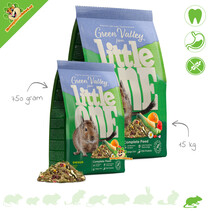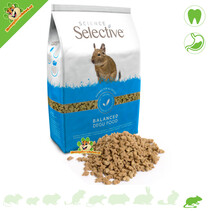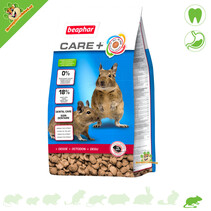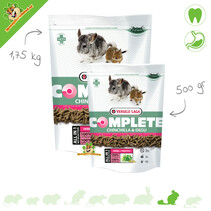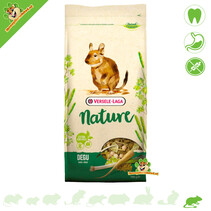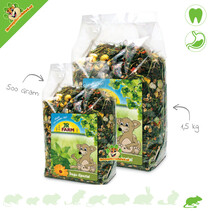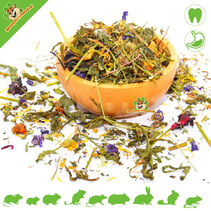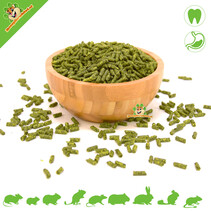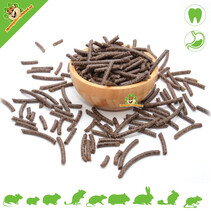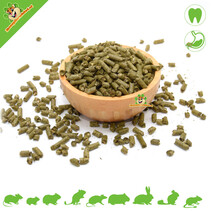Degu food and natural Degu food for Degus in the Degu Webshop!
- Ordered before 5 p.m., shipped the same day!
- Al 14 jaar een begrip!
- Delivery from our own stock
- Ordered before 5 p.m., shipped the same day!
- Al 14 jaar een begrip!
- Delivery from our own stock
You can easily and quickly order Degu food and natural Degu food at DRD Rodent Shop ®, the online Degu Webshop!
Are you looking for degu food for your beloved Degus? Welcome to the online destination for high-quality degu food and natural degu food! At DRD Rodent Shop Degoe Webshop you will find an extensive range of top brands, perfectly tailored to the specific needs of your degu. With us you can easily and quickly order different types and brands of degu food. We understand how important it is to give your degu the right food. Order today and give your little friend the tasty meals he deserves!
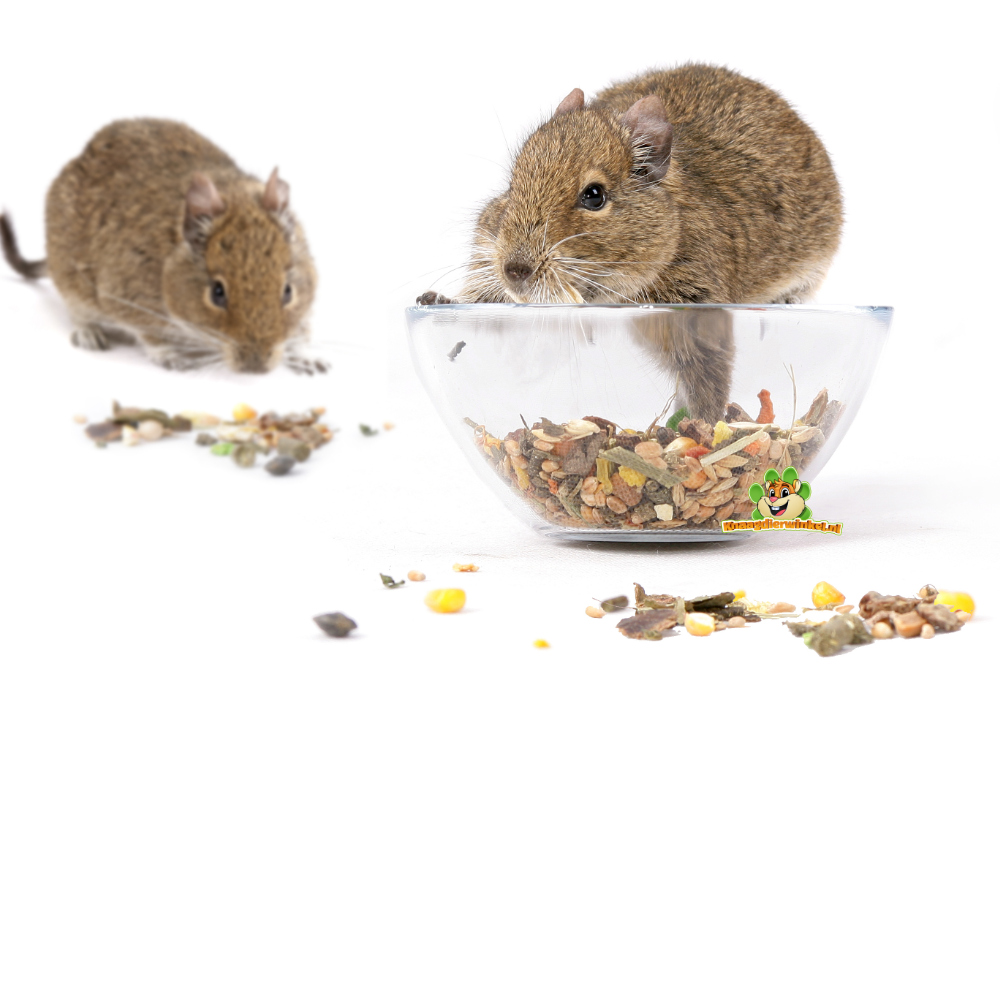
Natural Diet for Healthy Degus - Discover Our Offer!
Did you know that degus in the wild enjoy grasses, herbs, bark, leaves and more? With us you will find high-quality hay as a basic feed, supplemented with low-energy, balanced chunks full of essential nutrients. Ensure a healthy diet with our natural degu food!
Folivore/herbivore = collective name for plant-eating animals that specialize in herbs and leaves.
In the wild, degus eat grasses, herbs, bark, leaves, shrubs and wood. Degus need a plant-based diet that is rich in crude fibre and low in energy. A degu can also be fed fresh herbs, fresh grass or fresh vegetables of good quality. However, this is not a basic need. The basic diet and unlimited hay are necessary. Degus are prone to diabetes. Therefore, it is better not to feed fruit and sugary vegetables. If degus are fed a diet that is too rich in sugar and starch, the animals can develop diabetes. Degus need a high level of crude fibre. Different lengths of the fibre particles are important for the correct wear of the teeth, the loosening of the gastrointestinal filling, good intestinal peristalsis and for the fermentation process in the appendix. For the degu that is kept as a pet, this means that the basic diet for degus consists of high-quality hay and a low-energy, balanced, complete pellet. The pellet must contain all the required nutrients, minerals, trace elements and vitamins.
The gastrointestinal tract of a degu is not very muscular. In order to keep the digestive system going, food must be replenished continuously. In order to prevent digestive disorders, it is important that the animals can eat at any time. In order to prevent the animals from becoming too fat, it is important to choose a diet that is adapted to the specific animal species.
Feeding guide Degu food
Degus are herbivores. They naturally eat grasses, seeds, and dry plant parts. Degus need unlimited hay. This is important to get enough fiber. In addition, chewing on hay contributes to good tooth wear. In addition to hay, degus need a low-energy pellet that contains all the necessary nutrients, vitamins, and minerals. In addition, they need gnawing wood to wear down their teeth. Degus are naturally accustomed to a sparse diet. If they get too much sugar, they quickly become too fat. Fruit is therefore not suitable for degus, it contains too many natural sugars. In addition to hay, gnawing wood, and degu pellets, vegetables and herbs can also be fed. It is important that a new vegetable is introduced carefully. Always start with a very small piece, you can then slowly build this up. Also note that not all types of vegetables are safe for degus. Typical characteristics of the herbivorous digestive system of the degu are the teeth and molars that grow throughout their life, the weakly muscular gastrointestinal tract and the caecal fermentation with the eating of the caecal pellets. In the wild, degus spend a large part of the day taking in food. Eating breaks can cause digestive problems.
Diabetes Prevention and Digestive Health - Our Advice
Prevent diabetes in degus by avoiding sugary vegetables and fruits. Our feeding guide recommends unlimited hay, along with low-energy pellets, to keep the digestive system active. Give your degu the best diet for a healthy life!
Balanced Diet - Fat, Calcium and Protein
Degu food should not be too fatty. Degus cannot digest fat well. Food with sunflower seeds or peanuts for example is not suitable for degus because it contains too much fat.
Degu food should not contain too much calcium. Excess calcium is excreted through the urinary tract. Excess calcium can cause bladder stones or kidney stones. Once a degu has bladder or kidney stones, this can no longer be solved with food. The animal will have to be operated on by a veterinarian. It is therefore very important to prevent this. However, a calcium deficiency is also not good. A degu does need calcium for its teeth and bones. Adult degus need a calcium content of 0.6%. For growing degus this is 0.9%. The calcium phosphorus ratio should be between 1.5:1 and 2:1.
Strong Teeth and Chewing Fun - Fibers and Gnawing Wood
Fiber is crucial for dental health. Discover our food with a fiber content of about 20% and offer gnawing wood for healthy chewing pleasure. Keep your degu's teeth in top condition with our balanced diet.
The fibre content in degu food should be around 20%. Degus also get a lot of fibre from hay. Structural fibres from hay ensure that the degu has to chew for a long time and continuously. This chewing wears down the molars. This is very important because the molars continue to grow throughout life. Molars that are too long cause pain and can cause the degu to eat less hay, for example, with all the consequences for the digestion. In addition, prolonged chewing ensures that enzymes in the saliva already start the digestion. Fibres are also crucial for the fermentation process in the appendix.
Degu food & Protein
The cecal feces of the degu are rich in protein. This is then eaten again, after which the proteins can be digested. Too much protein in the diet can cause the degu to stop eating the cecal feces. This can have negative consequences for health and digestion.
Natural Treats - Approved Plant List
Stimulate your degu's natural taste buds with our list of approved plants. From Strawberry Leaf to Sunflower, offer a varied diet to your little friend!
Wild Plants |
Branches and Leaves |
Vegetables |
|---|---|---|
| Strawberry leaf Bindweed Amaranth Mountain savory Mugwort Buckwheat Chives Nettle (dried) Goldenrod Canadian fine-ray Wild garlic Dead Nettle Yarrow Speedwell Angelica Cow parsley Great Wall Plantain Cat's tail Large poppy Common agrimony Marigold Common pigweed Regular rocket Common Hogweed Hedge bindweed Horsetail Herik pigeonhole Ground Ivy Shepherd's purse Hop Hawkweed Horn flower deer hay Hedge vetch Incarnate clover Japanese knotweed Mallow/Malva Chamomile Cleavers Nodding avens Knotweed Knotweed Borage Compass lettuce Queen Anne's Lace Rapeseed Cornflower blue Cornflower Red Coltsfoot Clover Wood sorrel Burdock Look-without-look Sweet pea violet Daisy Marguerite Report Milk Thistle/Lady Thistle Avens stork's bill Dandelion Bee bread Arrowhead Cress Pennywort Pimpernel Bird's-foot trefoil Comfrey Coleus Runner seed Narrow-leaved plantain Evening primrose Torch Valerian Lamb's lettuce Field cress Cinquefoil Vetch Chickweed Toadflax Lady's mantle Bedstraw Chicory Wild carrot Winter purslane White Krodde White watercress Black Green Ground elder Silverweed Sunflower Coneflower/Echinacea Sorrel |
Currant bush |
Endive Celery Broccoli Zucchini Iceberg lettuce Cucumber Lettuce Bell pepper Parsnip Parsley root Pumpkin Purslane |


